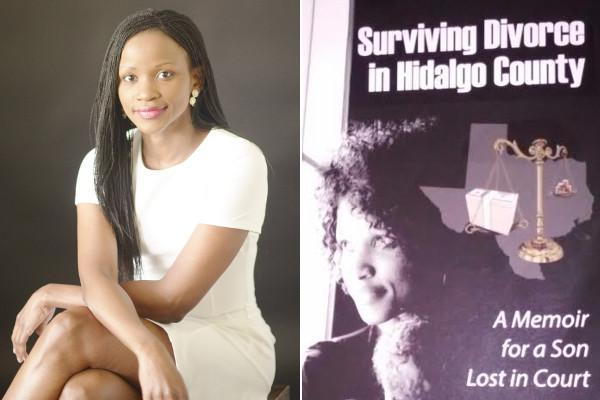A memoir is often an author’s attempt to use the storytelling tools of fiction to convey a true life experience.
Surviving Divorce in Hidalgo County is written by Tanzanian-American writer, Nikitia Yona. It tells the story of Eny Samuel, a woman whose charmed life is rudely interrupted in a loveless and abusive marriage.
Surviving Divorce is a narrative exploration of Nikitia Yona’s own experiences as a foreigner living in a small American town and being the victim of an unjust judicial system. But, as the title implies, Yona’s story is also one of survival. It’s a great story to read but also one that promises life lessons.
In our exclusive interview with Yona, she goes into detail about what moved her to write such a revealing account about a personal story of suffering and redemption.

What inspired you to write Surviving Divorce? What made you decide to be so open about your story?
It was a combination of things. Sometimes we go through remarkable experiences in our lives that need to be shared or exposed. But my eight year old son was by far my biggest inspiration for writing this memoir. When he was around four years old, he began asking questions including some about his dad and me. From why we weren’t living in the same house, and more recently questions such as how we met, why we got divorced, etc. I haven’t been able to answer some of his questions as he is still too young. So I wrote the book in the hope that it will provide him with as many truthful answers to some questions he may have when he’s older. There are facts about his family’s history and heritage, the challenges he may face in life like racial discrimination, relationships, peer pressure, bullying at school, etc. It’s all in there. I wanted the book in my words to serve as a conversation I would have had with him when he is older – even if I am no longer living. It was important that he knows my decision to go ahead and file for divorce from his dad, isn’t one I took lightly.
The other inspiration came from an unbelievable injustice I experienced with the judicial system of Hidalgo County in South Texas. It was vital for me to expose that because if it could happen to me in the manner that it did – it can happen to anyone!
Last but not least, there’s what transpired in my marriage that I felt I had to share. Here we are in 2015 and there is still this stigma that’s attached to divorces, particularly in our African culture that leaves many couples, but typically women feeling stranded and miserable in marriages that are clearly irretrievably broken! I was one of those women. While I do not advocate for divorces, there comes a point where it’s more toxic for all parties involved to remain married. Change can be intimidating, but I wanted to show that there is life after divorce.
What was it like recalling and writing such painful experiences?
I was a bag of mixed emotions. There were tears, laughter, sadness and even anger at times. Ultimately though, there was a sense of what I can only describe as relief from this heavy load.
What would you like readers to take away from the book?
That it’s ok to share our stories no matter how dark, uncomfortable or even embarrassing the subject matter. In fact, those are often the best human interest stories as they resonate with so many people on so many levels. I hope they realize that there is humor and beauty even in the toughest times. If you made mistakes, own them, learn from them, otherwise you will never fully move on. I would also say, don’t ever take responsibility for another’s actions. Women are often the guiltiest at that. When our partners cheat, the first thing we do is look within ourselves for the reason, even when we know otherwise. ‘Perhaps I put on/lost too much weight, perhaps I have aged, perhaps I became too focused on my career, or the kids. We often embark on this impossible quest to change ourselves into something we are not in the hope it will restore his desire for us. Of course we know that rarely ever works because in such cases, the change has to come from him! But here you are giving him your best, you look like Halle Berry, he cheats on you with she that looks like Chuck Berry – and you think you are the problem? Do not be afraid to call out and hold people accountable for their actions.
When did you first think about coming out with your story? And how long did it take until it was published?
I believe the thought first crossed my mind about six months after I filed for primary custody of my son in 2010. He had sustained five head injuries in his dad’s care, in as many months. He told his teachers and I each time, “My daddy beat me for being a bad boy.” Child Protective Services were called multiple times by the school, and by me. They never submitted a single report of their findings to the school, nor I. Their incompetency was astonishing. Additionally, upon returning to court for primary custody that’s when the blatantly unethical practices of the attorneys and the presiding judge in this case quickly became more evident. Some of their actions included postponing the case and prolonging it for what I now know was their financial gain. Meanwhile, I kept a record of all these events. Shortly after my custody trial in 2012, I took all my diaries from over the years to my therapist. I asked her to please read them because they were more detailed than any face-to-face conversation I could have had with her. I wanted to know where, why, how my marriage went so wrong and my role in its demise and get closure. The day she returned them to me having completed reading them she said, “Nakitia, you need to write a book!!” By January 2013, one of my New Year’s resolutions was to start on the book. It was about fifteen months before I submitted the first manuscript to a publisher, and another seven months before it was published.
If you could give one advice to women or men with a similar experience, what would it be?
Do not lie to your kids. Handle them with the utmost care. Put your egos and pride aside. Take the time to prepare them for the imminent changes to their lives e.g. if one parent is moving out, etc. Listen to their feedback and/or consider professional counselling for them. You don’t have to go into the ugly details but do not make excuses for either parent’s bad behavior, especially if the kids have witnessed it. I have a chapter in my book, ‘There is no lower being than a co-parent who uses your own child to hurt you.” Do not use your children as weapons to hurt the other parent.









Meryamm May 21, 2015 09:02
Amazing story Nikitia Yona - you are amazing God bless I am very proud of you!